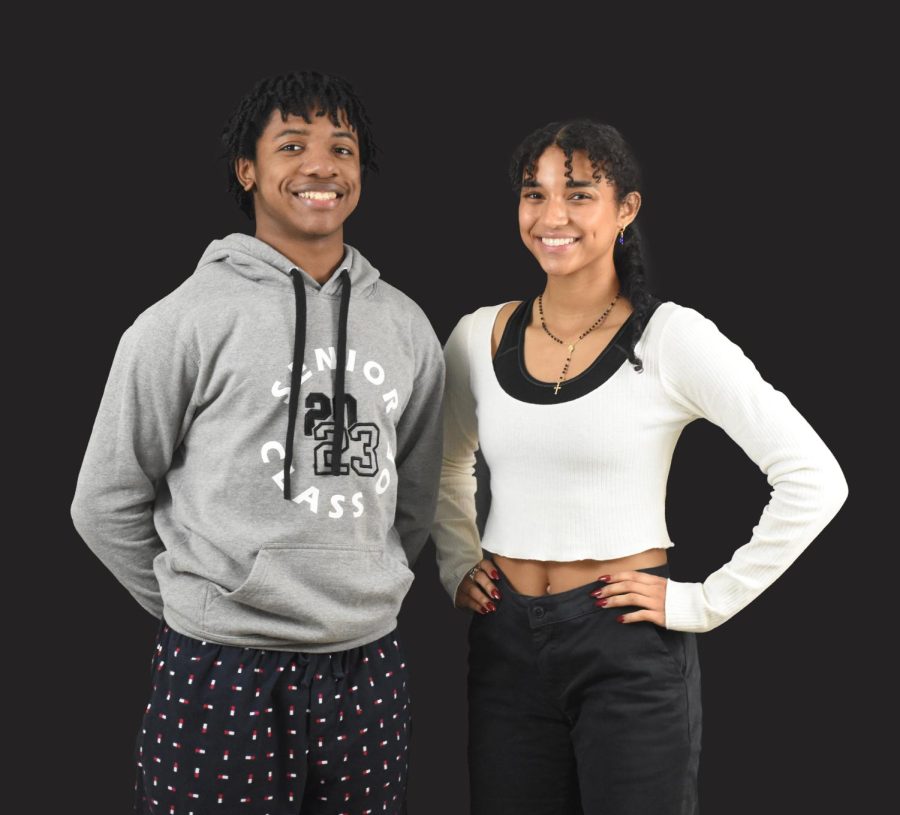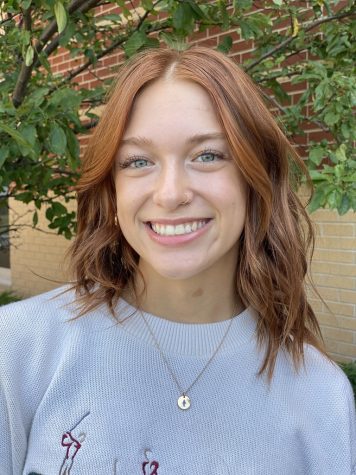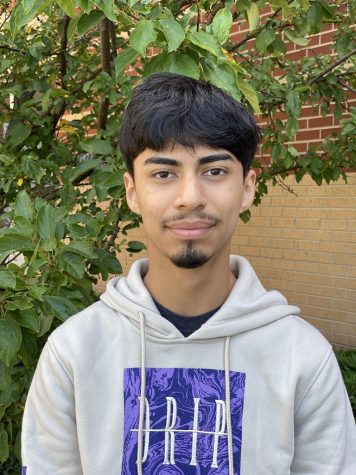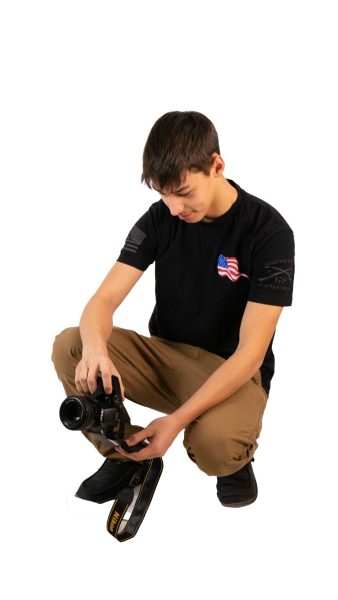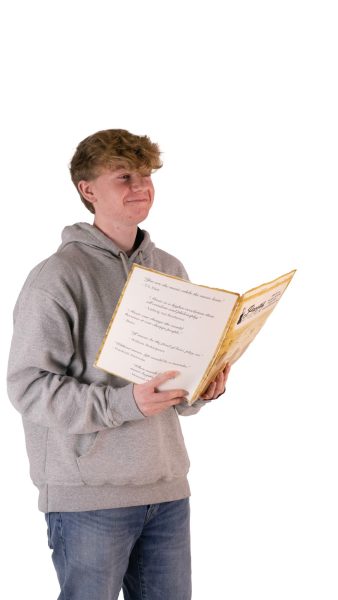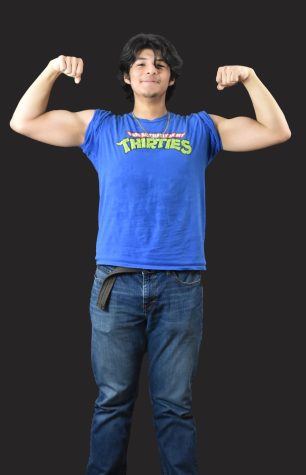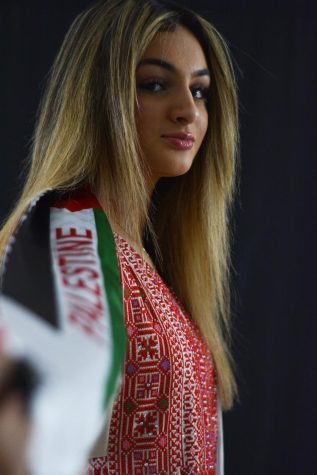DEFINING EXCELLENCE
May 5, 2023
Everyday we saw students being active in sports, clubs, volunteer work, and outside in the community. Some did it to put credentials on their college applications, and others just wanted something to be apart of. For seniors Terrell Spencer (12) and Vivian Jones (12) what was important to them was representation in the school. As Afro-Latina and African American students, Jones and Spencer wanted to display their excellence for the community to see.
“I was the president of minorities empowerment,” Jones said. “I was also in Key Club, National Honor Society, Latinos Con amigos, and I used to tutor special needs students. I did varsity basketball, track, I also played volleyball, and then I ran cross country.”
Spencer was involved in track, but focused much of his time on Junior and Senior class as his position as President and other academics.
“I’m in an academy, communications, I do track and I’m the senior class president,” he said. “I used to be in minorities empowerment before it disbanded, I was the spokesperson for it. I was in Student Council for two years. I was also the junior class president, and I’m in Choral.”
With both of their time on the track team, it allowed them many opportunities such as competing in the state track meet. It also landed Jones a spot on University of Wisconsin-Milwaukee’s track team as a seven event competitor, but COVID made the athletes suffer a massive damper in their training.
“Our freshman year was COVID and then my sophomore year I was out December to late May,” Jones said. “[I had a] back injury so I didn’t really have a sophomore season. I ran in one meet and then regionals and sectionals, then I fell short of state. This [past] season was like my comeback season, I have something to prove. I went to state for both the 300 hurdles and the 100 hurdles, I was first in the section for both, I was seeded on 15th for the hurdles, 13th for the 300 hurdles, and then when I competed, I finished 13th in the one hundreds and I went to the finals for the threes, and then I placed him in the state finals. So it was really awesome. My mom’s my hurdle coach, so it was so rewarding. I made it this time, and I went to the finals.”
Spencer started track in eighth grade, and took a break freshman and sophomore year.
“I was really upset because I was looking forward to [track] all [of freshman] year, and then the year after that there was COVID,” Spencer said. “It was boring, but it was nice for me at the same time because I liked being at my house. It definitely has affected me to be honest because I feel like I was robbed a lot of like my high school time. People say how it’ll come by so fast. I [ran] last year and it was pretty okay to be back. This year I think it’s going to be the best year I’ve ever done for sure.”
Being class president both junior and senior year came to show Spencer’s dedication to the students. He wanted to be involved as much as he could as president, even though certain years did not allow for it.
“To be completely honest, junior year we really didn’t do anything besides help set up for prom, but I mean, we really couldn’t do anything else besides that,” Spencer said. “[Now] it’s way more than that. Right now, we’re working on the class shirt, and after that we’re going to be working on prom or our senior activity, and then graduation. I feel way more involved being senior class president than I was being a junior class president for sure. It definitely taught me to be more mature and be more outgoing. If I would have never [been president], I would have never been able to get the [same] opportunities.”
Having roles of leadership and responsibility were important to both students. Spencer and Jones having presidential positions allowed them the ability to speak up for themselves and for other minority groups. When the KUSD School Board held a special meeting on Jan. 10 and 11 to discuss Policy 1510, the ability for pride flags and other minority empowerment flags to be up in the classroom, both Jones and Spencer knew they had to speak.
“I think that it’s really important because there’s students that aren’t as comfortable speaking up, especially to adults in that huge like school board meeting,” Jones said. “I feel like I can be the voice for the students. I feel like they don’t always have a voice, and it’s minority issues like people of color or LGBTQ+ community. Some people don’t have the courage to take that step. I want to be the person to take that step for them to make them feel comfortable in the school.”
The flag debate was not the first issue that Jones and Spencer felt targeted minority groups at the school.
“The huge divide in races,” Jones added. “I feel like, there’s definitely a difference in how the kids act like. It’s not specific to races, but in every every race of kids, there’s the group of ignorant people that [say] ‘I’ll excuse it’, or ‘I’ll partake in the ignorance’. I feel like that definitely needs to be addressed and I think needs to be cracked down on more harshly. I also believe that queer issues need to be cracked down on. I feel like sometimes in the school system, it’s overlooked and seen as political, like the board today. Identity and minority issues should be addressed.”
These issues were why Spencer and Jones both agreed that minorities need more representation. Students needed someone to look up to that had their culture or background, and Jones and Spencer were willing to take on that role.
“It’s important to have minority representation in our school because it helps minorities feel better about themselves,” Spencer said. “A lot of people will be more wiling to enjoy and participate in [clubs, academics, sports] if they see people like them doing it. It’s the same thing with minorities in the Olympics and celebrities, etc. By seeing our representation in the things we are interred in or currently involved in, it makes us want to [participate] as well.”


